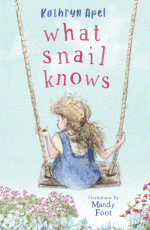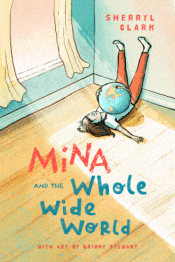
What Snail Knows
What Snail Knows
Kathryn Apel
Mandy Foot
UQP, 2022
232pp., pbk., RRP $A14.99
9780702265464
“It’s just you and me, Lucy. We don’t need nobody else.”
How many times had Lucy heard that as Dad packed up their old brown car again, and they moved to yet another caravan park and, for Lucy, a new school? It seems that since her mum died, she and her dad have been constantly on the move from place to place, school to school and if the memories themselves weren’t enough, there were the reminders at school where teachers asked students to make Mother’s Day cards or draw their family tree. Lucy sees them as just a seed of a family, but desperately wishes there were branches like other families.
So when she discovers Snail carrying his home on his back, a home he can tuck himself inside whenever things get tough, it seems like the ideal pet for her and so he joins them in his special box in the caravan. And just as Snail becomes more used to his surroundings, gains confidence and tentatively comes out of his shell, so does Lucy. Even though there are the usual adjustments to make as she starts yet another new school, gradually she starts to fit in and make friends as together the students investigate how they can help each other, their families and their communities under the sensitive and caring Miss Darling. Does it really just have to be Lucy and her dad keeping themselves to themselves, or is there room for others as well?
This is a most poignant verse novel for young independent readers that will resonate with so many – Lucys who are the new kid, yet again, and who have already learned to build the defensive walls to protect themselves; teachers who have had new students start this year and who will have a host of reasons for starting a new school but will have “new kid” syndrome in common; and students who are comfortable in their established friendship groups and are wary of how the dynamics will change if someone new enters… And each will take something different away after having read it.
Written in the present tense from Lucy’s perspective each poem raises all sorts of issues that can be explored to help students understand the various perspectives and themes, while each blends into the next to build a potent story of loneliness, friendship, acceptance, and building and connecting with community. How can we each reach out to the new kid, our classmates, our families and those in the broader circle, particularly the lonely and the vulnerable, to build communities again, particularly after the isolation of the last two years? Even without cane toads to conquer, could this rain and these floods on the East Coast, in fact, have a silver lining?
